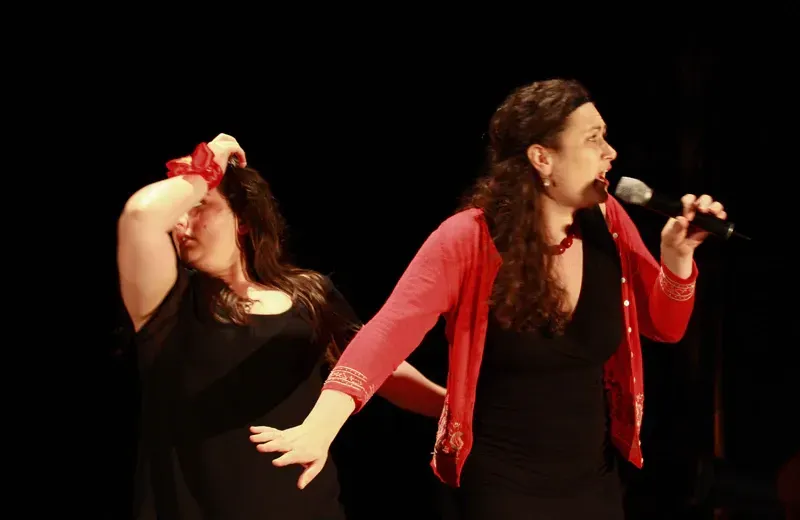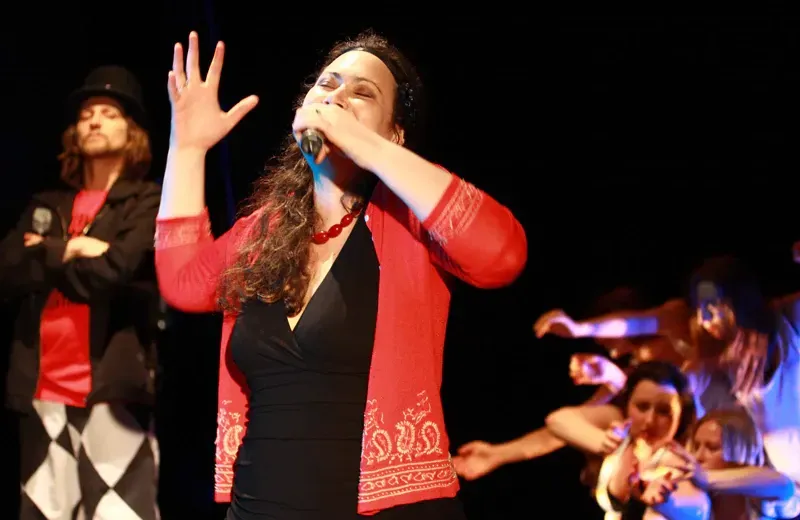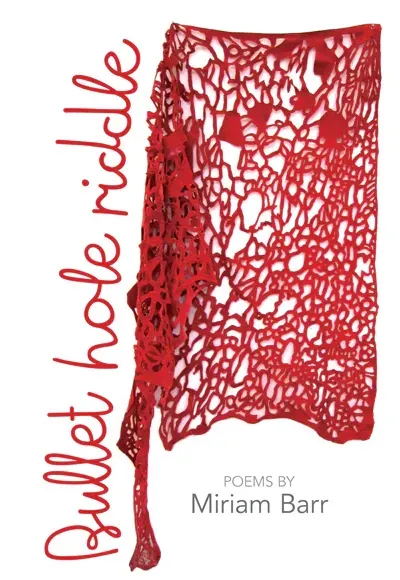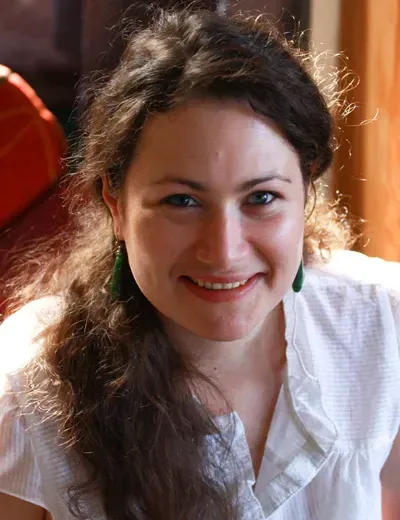Poetry and Riddles
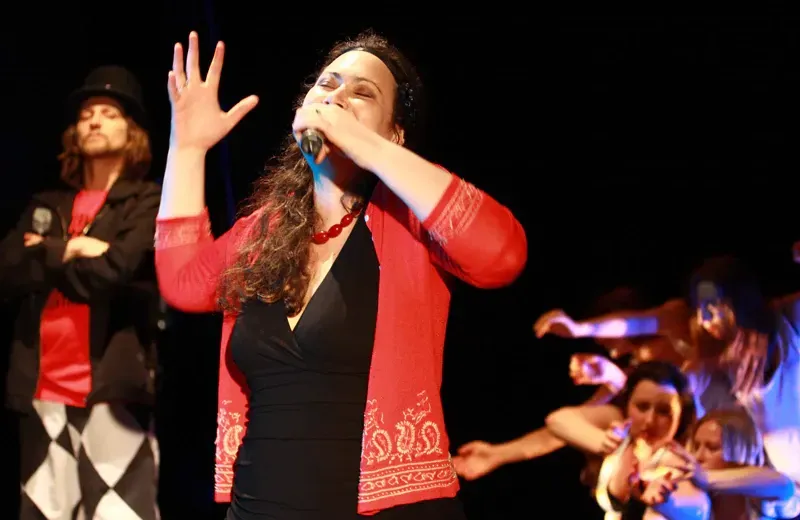
Auckland-based poet Miriam Barr launches a new work, Bullet Hole Riddle, this coming weekend. Renee Liang talks to her about the process of putting it together.
* * *
I’ve known Miriam since the days we were both MCs at Poetry Live, Auckland’s long running live poetry venue. We’ve performed together and, because Poetry Live seems to be one of those creative hives, cooperated on running many community events, including guerrilla poetry (public poetry ambushes) and creative blind dating (pretty romantic). Miriam has even talked me into being one of her poetry prostitutes (performing poetry one-on-one for a small fee.) I know how damn hard Miriam works at everything she decides to do, poetry being only one of those things. And I know how much her life is bound up in her poetry. So it’s pretty special that I got to read an advance copy of Bullet Hole Riddle, her new poetry collection.
How long has it taken you to put together this collection?
It’s been seven years and 29 drafts. Over the years I’ve gone back to rework the earliest pieces with a different perspective. Because I’ve been performing a lot of the poems throughout the process, there’s video and audio evidence of a lot of the earlier versions online. That’s been really interesting to be able to look back at from this point.
It feels like a journey... did you start at the beginning, or in the middle?
I wanted the book to be a story that moved you chronologically through time. The parts of the narrative definitely weren’t revealed to me in a tidy sequence like that though. It’s been a process of gathering the parts and putting them together. The first poems I wrote were close to the beginning. After that, I’d usually be writing about the past and the present at the same time or skipping around time to fill in gaps in the narrative. So the first section of the book contains both the oldest and the most recently written poems in the collection.
I love the spaces in your poems. They feel like breaths to me. Are they written to be read aloud?
For me part of the bliss of poetry is in the sounds that letters and words make as they rub up against each other or stand apart. I love how a word can mean something different when it is heard and seen on a page. I can’t help but write with that in mind. Though I’ve never once sat down and thought; ‘now I’m going to write a poem for people to read out loud.’ I often ‘hear’ them first, before I produce any words on a page. Each poem has its own voice, a pace, a rhythm, and often also physical movement – hence my need to perform them. The spaces are there to give a frame for that on the page I guess. Reading aloud is part of my editing process – even for poems that are entirely visual. I need to know how it sounds, how it falls out of the mouth before I can finish them. Sound is always part of it for me. I think we ‘hear’ the sound of a poem when we read it silently too.
Your poems feel intensely private to me. How does it feel to give them to strangers?
It’s a vulnerable space to hold in some moments. In others it is liberating. There’s a line in the book about how ‘secrets have teeth’. I figure, I’ve based a book on mine now. No more secrets. No more teeth. On many levels they are very private but there’s also a fair bit of fictionalising and selectivity that’s happened too. It’s poetry after all, and in poetry sometimes the best way to tell the truth is not with the exact details. While it is based on me, it’s also not only about me. I am speaking to the psychological level through the lens of my experience.
My background is in psychology and I began the book during my Master’s research, which considered universal psychological factors (as opposed to individual differences). Our experiences don’t unfold in a vacuum; they are affected by the people and systems around us. Often these poems are not really about me at all, but about the space between self and others, how that space is transgressed and reclaimed. I’m just my own nearest example.
This collection speaks to me about love: good love, bad love, love of self. Could you have written this ten years ago?
I’m so glad you picked that, because I see it as a love story in a lot of ways. I’m not sure bad love is quite the right description, rather love’s antithesis, but at the core of the riddle is how to love others, be loved and love oneself when we have been wounded by others.
I don’t think I could have written this before and there is a reason it has taken so long – certain things had to be moved through first. I needed distance. In the self-published books I did, there are these angry, venting poems full of viscera. It’s like I wanted to punch everyone in the face with what happened. In comparison, for me, Bullet Hole Riddle is written with distance, as more of an observer in a sense – I couldn’t write from that place before – it didn’t exist for me. I was too in it to write about it with craft. I feel like I have developed restraint in my writing in the last decade. I didn’t have the restraint for this a decade ago. I was all about ‘the first thought is the best thought’ then. I remember I used to be against editing. Oh how things have changed.
You're juggling full time study, part time work and family life: any tips on keeping on writing?
Keeping night-owl hours helps, though that’s a habit I’m trying to break. I also have a notebook by the bed and in my bag, so I can write things down as they come to me – snippets I can expand on or pull together later when there’s space. And I try to keep saying yes to every chance I get to collaborate with other artists. Having little projects on the boil keeps the impetus to write going when there are so many competing demands.
What are you working on next?
I’ve been working on an exhibition called NOW with photographer Faye Norman. It opens at Art Station on the 16th of November a couple of weeks after the launch. I’m not sure what will come next. I think I might try to enjoy this small victory for a little while first. I’ll be heading home to the far north for the summer to work on my thesis; maybe I’ll take Bullet Hole Riddle on the road with me.
